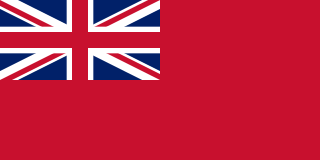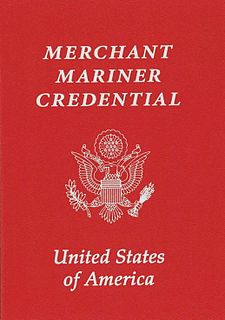Related Research Articles

The United States Merchant Marine refers to either United States civilian mariners, or to U.S. civilian and federally owned merchant vessels. Both the civilian mariners and the merchant vessels are managed by a combination of the government and private sectors, and engage in commerce or transportation of goods and services in and out of the navigable waters of the United States. The Merchant Marine primarily transports cargo and passengers during peacetime; in times of war, the Merchant Marine can be an auxiliary to the United States Navy, and can be called upon to deliver military personnel and materiel for the military. Merchant Marine officers may also be commissioned as military officers by the Department of Defense. This is commonly achieved by commissioning unlimited tonnage Merchant Marine officers as Strategic Sealift Officers in the United States Navy Reserve.

The Merchant Navy is the maritime register of the United Kingdom, and comprises the seagoing commercial interests of UK-registered ships and their crews. Merchant Navy vessels fly the Red Ensign and are regulated by the Maritime and Coastguard Agency (MCA). King George V bestowed the title of "Merchant Navy" on the British merchant shipping fleets following their service in the First World War; a number of other nations have since adopted the title.
A second mate or second officer (2/O) is a licensed member of the deck department of a merchant ship holding a Second Mates Certificate of Competency, which is issued by the administration. The second mate is the third in command and a watchkeeping officer, customarily the ship's navigator. Other duties vary, but the second mate is often the medical officer and in charge of maintaining distress signaling equipment. On oil tankers, the second mate usually assists the chief mate with the Cargo operations.

A third mate (3/M) or third officer is a licensed member of the deck department of a merchant ship. The third mate is a watchstander and customarily the ship's safety officer and fourth-in-command. The position is junior to a second mate. Other duties vary depending on the type of ship, its crewing, and other factors.
International Convention on Standards of Training, Certification and Watchkeeping for Seafarers (STCW), 1978 sets minimum qualification standards for masters, officers and watch personnel on seagoing merchant ships and large yachts. STCW was adopted in 1978 by conference at the International Maritime Organization (IMO) in London, and entered into force in 1984. The Convention was significantly amended in 1995.

The deck department is an organisational team on board naval and merchant ships. The department and its manning requirements, including the responsibilities of each rank are regulated within the STCW Convention. The department is led by deck officers, who are licensed mariners and they are commanded overall by the ship's captain. Seafarers in the deck department work a variety of jobs on a ship or vessel, but primarily they will carry out the navigation of a vessel, from the bridge. However, they are usually also responsible for supervising and monitoring any maritime cargo onboard, as well as ensuring maintenance of the deck and upper hull structure, monitoring the stability of the ship including loading and discharging ballast water, carrying out mooring operations and finally anchoring a ship.
Under the Seafarers' Identity Documents Convention, 1958, countries with a Merchant Navy or Merchant Marine require identifying credentials for their mariners. The Merchant Mariner's Document (MMD) or Z-card in the United States, and the Ordinary Seaman's Certificate in the United Kingdom are examples of these credentials.

An oiler is a worker whose main job is to oil machinery. In previous eras there were oiler positions in various industries, including maritime work, railroading, steelmaking, and mining. Today most such positions have been eliminated through technological change; lubrication tends to require less human intervention, so that workers seldom have oiling as a principal duty. In the days of ubiquitous plain bearings, oiling was often a job description in and of itself.

A wiper is the most junior rate in the engine room of a ship. The role of a wiper consists of cleaning the engine spaces and machinery, and assisting the engineers as directed. The position is an apprenticeship to become an oiler. In modern times, a wiper is required to work on a ship for a specific amount of time, gaining what is referred to as "sea time."

An able seaman (AB) is a naval rating of the deck department of a merchant ship with more than two years' experience at sea and considered "well acquainted with his duty". An AB may work as a watchstander, a day worker, or a combination of these roles. Once a sufficient amount of sea time is acquired, then the AB can apply to take a series of courses/examinations to become certified as an officer.
An ordinary seaman (OS) is a naval rating of the deck department of a ship. The position is an apprenticeship to become an able seaman, and has been for centuries. In modern times, an OS is required to work on a ship for a specific amount of time, gaining what is referred to as "sea time". For centuries, the term ordinary seaman was used to refer to a seaman with between one and two years' experience at sea, who showed enough seamanship to be so rated by their captain. Historically in some navies and the merchant marine a sailor with less experience was called a landsman.

A licensed mariner is a sailor who holds a license from a maritime authority to hold senior officer-level positions aboard ships, boats, and similar vessels. Qualification standards for licensed mariners are universally set by the STCW Convention adopted and promulgated by the International Maritime Organization (IMO), while the licenses of individual sailors are issued by the delegated maritime authorities of the member states of the IMO; these may vary in the details of the implementation, including the government agency responsible for licensing and the local names of the grades and qualifications in each particular country.

A merchant navy or merchant marine or mercantile marine is the fleet of merchant vessels that are registered in a specific country. On merchant vessels, seafarers of various ranks and sometimes members of maritime trade unions are required by the International Convention on Standards of Training, Certification and Watchkeeping for Seafarers (STCW) to carry Merchant Mariner's Documents.

The Merchant Mariner Credential (MMC) is a credential issued by the United States Coast Guard in accordance with guidelines of the International Convention on Standards of Training, Certification and Watchkeeping for Seafarers (STCW) to United States seafarers in order to show evidence of a mariner's qualifications. It will become the standard documentation required for all crew members of U.S. ships with a Gross Tonnage of over 100 and for all vessels required to operate with a licensed Master, regardless of size. As previously issued but still valid credentials expire, the MMC will replace the Merchant Mariner's Document, merchant mariner license, Certificate of Registry, and STCW Certificate.
A master mariner is a licensed mariner who holds the highest grade of seafarer qualification; namely, an unlimited master's license. Such a license is labelled unlimited because it has no limits on the tonnage, power, or geographic location of the vessel that the holder of the license is allowed to serve upon. A master mariner would therefore be allowed to serve as the master of a merchant ship of any size, of any type, operating anywhere in the world, and it reflects the highest level of professional qualification amongst mariners and deck officers.

Filipino seamen, also referred to as Filipino seafarers or Filipino sailors, are seamen, sailors, or seafarers from the Philippines. Although, in general, the term "Filipino seamen" may include personnel from the Philippine Navy or the Philippine Marine Corps, it specifically refers to overseas Filipinos who are "sea-based migrant Filipino workers".
Vessel safety surveys are important during the life of a vessel for better safety and security. These controls are directed by the classification societies and are very different. For more details refer to the SOLAS. In order for a ships to have the authorisation to navigate there are controls in the harbor and also controls for the cargo. The seafarers must have the knowledge of surveys, to avoid human and economic disasters.

A sailor, seaman, mariner, or seafarer is a person who works aboard a watercraft as part of its crew, and may work in any one of a number of different fields that are related to the operation and maintenance of a ship.

The Government Shipping Office is an agency in the Government of Pakistan that registers and manages sailors in the Pakistan Merchant Navy. The Government Shipping Office was first established in 1923 under the Merchant Shipping Act. It was a subordinate office of the then-Ministry of Communications, now reorganised as the Ministry of Ports and Shipping, under the administrative control of Ports and Shipping Wing, Karachi.
Seaman Service Book (SSB) is a continuous record of a seaman’s service issued in Pakistan. This document certifies that the person holding is a seaman as per the International Convention on Standards of Training, Certification and Watch keeping for Seafarers (STCW), 1978, as amended from time to time. Seaman Book is one of the compulsory document for applying crew transit visas. The record of employment on board of a merchant ship is recorded in a Seaman Service Book. Different countries issue to their seafarers the similar service book with different names i.e. Seaman Record Book, Seaman Discharge Book etc. In Pakistan Government Shipping Office issue this book under section 120 of Merchant Shipping Ordinance, 2001. It is mandatory for all seafarers serving on board ship, whether they are on the Minimum Safe Manning Certificate or not, to hold a "Seaman Service Book and Seaman Identity Document" (SID).
References
- ↑ "Merchant Shipping (Continues Discharge Certificate-cum-Seafarers Identity Document) Rules, 2001". www.dgshipping.gov.in. Ministry of Shipping, Government of India. Retrieved 19 April 2018.